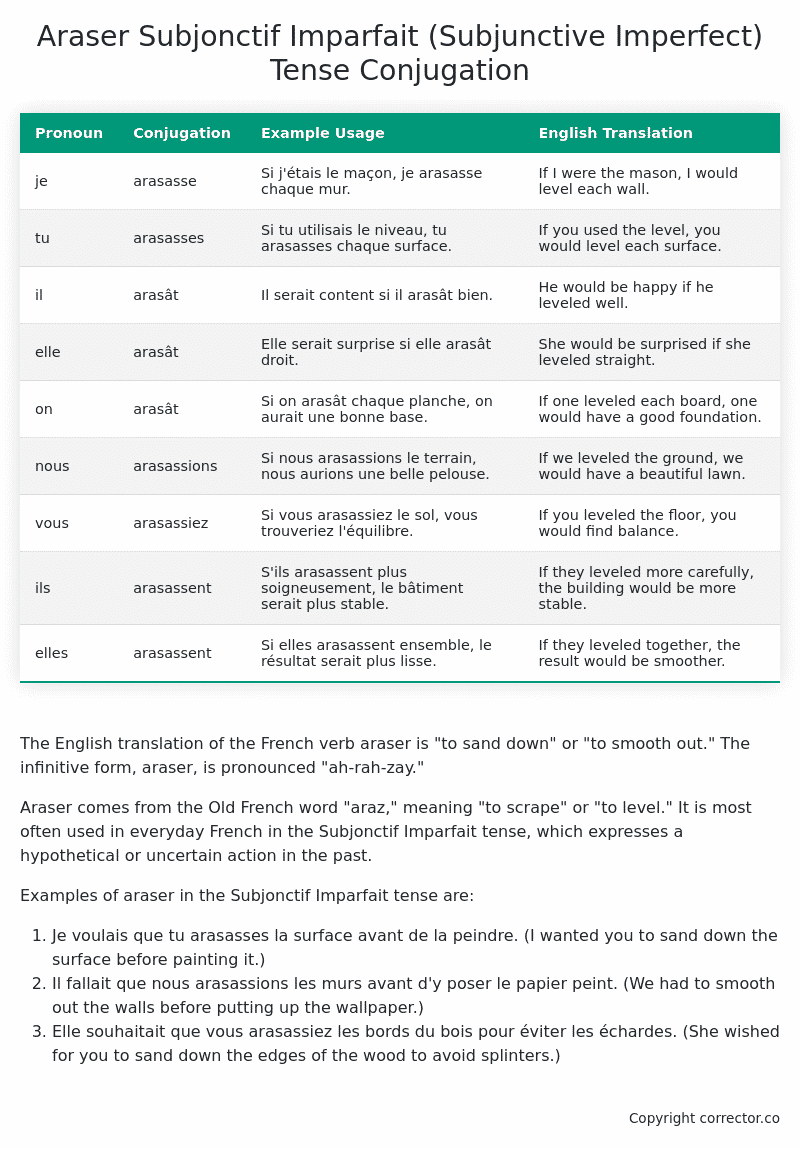Subjonctif Imparfait (Subjunctive Imperfect) Tense Conjugation of the French Verb araser
Introduction to the verb araser
The English translation of the French verb araser is “to sand down” or “to smooth out.” The infinitive form, araser, is pronounced “ah-rah-zay.”
Araser comes from the Old French word “araz,” meaning “to scrape” or “to level.” It is most often used in everyday French in the Subjonctif Imparfait tense, which expresses a hypothetical or uncertain action in the past.
Examples of araser in the Subjonctif Imparfait tense are:
- Je voulais que tu arasasses la surface avant de la peindre. (I wanted you to sand down the surface before painting it.)
- Il fallait que nous arasassions les murs avant d’y poser le papier peint. (We had to smooth out the walls before putting up the wallpaper.)
- Elle souhaitait que vous arasassiez les bords du bois pour éviter les échardes. (She wished for you to sand down the edges of the wood to avoid splinters.)
Table of the Subjonctif Imparfait (Subjunctive Imperfect) Tense Conjugation of araser
| Pronoun | Conjugation | Example Usage | English Translation |
|---|---|---|---|
| je | arasasse | Si j’étais le maçon, je arasasse chaque mur. | If I were the mason, I would level each wall. |
| tu | arasasses | Si tu utilisais le niveau, tu arasasses chaque surface. | If you used the level, you would level each surface. |
| il | arasât | Il serait content si il arasât bien. | He would be happy if he leveled well. |
| elle | arasât | Elle serait surprise si elle arasât droit. | She would be surprised if she leveled straight. |
| on | arasât | Si on arasât chaque planche, on aurait une bonne base. | If one leveled each board, one would have a good foundation. |
| nous | arasassions | Si nous arasassions le terrain, nous aurions une belle pelouse. | If we leveled the ground, we would have a beautiful lawn. |
| vous | arasassiez | Si vous arasassiez le sol, vous trouveriez l’équilibre. | If you leveled the floor, you would find balance. |
| ils | arasassent | S’ils arasassent plus soigneusement, le bâtiment serait plus stable. | If they leveled more carefully, the building would be more stable. |
| elles | arasassent | Si elles arasassent ensemble, le résultat serait plus lisse. | If they leveled together, the result would be smoother. |
Other Conjugations for Araser.
Le Present (Present Tense) Conjugation of the French Verb araser
Imparfait (Imperfect) Tense Conjugation of the French Verb araser
Passé Simple (Simple Past) Tense Conjugation of the French Verb araser
Passé Composé (Present Perfect) Tense Conjugation of the French Verb araser
Futur Simple (Simple Future) Tense Conjugation of the French Verb araser
Futur Proche (Near Future) Tense Conjugation of the French Verb araser
Plus-que-parfait (Pluperfect) Tense Conjugation of the French Verb araser
Passé Antérieur (Past Anterior) Tense Conjugation of the French Verb araser
Futur Antérieur (Future Anterior) Tense Conjugation of the French Verb araser
Subjonctif Présent (Subjunctive Present) Tense Conjugation of the French Verb araser
Subjonctif Passé (Subjunctive Past) Tense Conjugation of the French Verb araser
Subjonctif Imparfait (Subjunctive Imperfect) Tense Conjugation of the French Verb araser (this article)
Subjonctif Plus-que-parfait (Subjunctive Pluperfect) Tense Conjugation of the French Verb araser
Conditionnel Présent (Conditional Present) Tense Conjugation of the French Verb araser
Conditionnel Passé (Conditional Past) Tense Conjugation of the French Verb araser
L’impératif Présent (Imperative Present) Tense Conjugation of the French Verb araser
L’infinitif Présent (Infinitive Present) Tense Conjugation of the French Verb araser
Struggling with French verbs or the language in general? Why not use our free French Grammar Checker – no registration required!
Get a FREE Download Study Sheet of this Conjugation 🔥
Simply right click the image below, click “save image” and get your free reference for the araser Subjonctif Imparfait tense conjugation!

Araser – About the French Subjonctif Imparfait (Subjunctive Imperfect) Tense
Formation
Common Everyday Usage Patterns
Interactions with Other Tenses
Subjonctif Présent
Indicatif Passé Composé
Conditional
Conditional Perfect
Summary
I hope you enjoyed this article on the verb araser. Still in a learning mood? Check out another TOTALLY random French verb conjugation!


